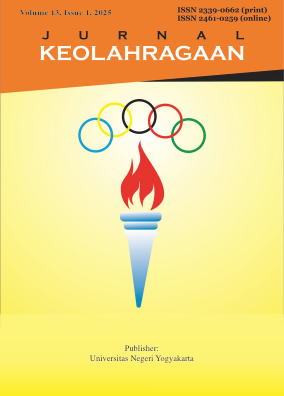Strategic development of a quality PE system in Cambodia
DOI:
https://doi.org/10.21831/jk.v13i1.38702Keywords:
physical education, curriculum implementation, educational reform, policy integrationAbstract
Cambodia is currently undergoing comprehensive education reform, with Physical Education (PE) emerging as a distinct and strategically important area. This study explores the structural and systemic development of PE within Cambodia's Ministry of Education, Youth and Sport (MoEYS), emphasizing the role of international collaboration, particularly through the NGO Hearts of Gold (HG) and the Japan International Cooperation Agency (JICA). Since 2006, several initiatives have been implemented to develop PE curricula and teacher training systems across primary, lower secondary, and upper secondary levels. However, despite policy progress, PE implementation remains inconsistent due to gaps in teacher training, unclear curriculum alignment, and inter-departmental coordination. This study uses a qualitative, documentary-based approach to analyze curriculum frameworks, institutional structures, and training systems. Findings highlight the critical need for integrated planning among key departments (DPESS, NIPES, and GDS) and a consistent training pipeline for PE teachers. Moreover, the study identifies a lack of pedagogical content in earlier PE classes, where activities were limited to basic physical drills without educational objectives. The research proposes a strategic plan that focuses on improving curriculum implementation, reinforcing teacher training through pre-service and in-service alignment, and ensuring systemic oversight for sustainable development. Ultimately, this paper advocates for a holistic PE system that is inclusive, quality-oriented, and aligned with Cambodia’s broader educational reforms, to foster lifelong physical literacy and student development.
References
Chaudhary, C. (2024). Cultivating social values in youth: The positive impact of physical education and sport. International Journal of Sports, Health and Physical Education. https://doi.org/10.33545/26647559.2024.v6.i1b.113
Committee on Physical Activity and Physical Education in the School Environment, Food and Nutrition Board, & Institute of Medicine. (2013). Educating the student body: Taking physical activity and physical education to school (H. W. Kohl III & H. D. Cook, Eds.). National Academies Press
Hardiansyah, H., Sulistiyono, S., & Nugroho, S. (2024). Pengaruh olahraga dalam pembentukan karakter remaja: Literature review. Jurnal Dunia Pendidikan, 5(1), 244–255. https://doi.org/10.55081/jurdip.v5i1.2609
Hasnah, S., Susanto, N., Syafruddin, S., Solehuddin, M., Yuniarti, E., & Irawan, I. (2023). Implementing Islamic values in physical education and sports to foster the character of Ulul Albab. At‑Ta’dib, 18(1), 18–27. https://doi.org/10.21111/attadib.v18i1.9909
Kellstedt, D. K., Schenkelberg, M. A., Essay, A. M., & others. (2021). Youth sport participation and physical activity in rural communities. Archives of Public Health, 79, Article 46. https://doi.org/10.1186/s13690-021-00570-y
Ministry of Education, Youth and Sports (2004). 2005–2009 MoEYS Policy for Curriculum Development. Phnom Penh, Cambodia.
Ministry of Education, Youth and Sports (2007). Primary School Physical Education Curriculum, Department of Physical Education and Sport for Students, Phnom Penh, Cambodia
Ministry of Education, Youth and Sports (2014). Primary School Physical Education Teachers’ Manual, Department of Physical Education and Sport for Students, Phnom Penh, Cambodia
Ministry of Education, Youth and Sports (2016). Lower Secondary School Physical Education Curriculum, General Directorate of Sport, Phnom Penh, Cambodia
Ministry of Education, Youth and Sports (2019). Lower Secondary School Physical Education Teachers’ Manual, General Directorate of Sport, Phnom Penh, Cambodia
Ministry of Education, Youth and Sports (2019). Physical Education Curriculum of Upper Secondary School. Draft July 2019, Phnom Penh, Cambodia
Mustafa, P. S., Suherman, W. S., Sumarjo, S., Nurhidayah, D., Lufthansa, L., & Anugrah, T. (2024). Analysis of design and implementation of physical education curriculum in primary school: A literature study. Retos, 60, 320–331. https://doi.org/10.47197/retos.v60.107950
National Association for Sport and Physical Education (2007). Physical Education Teacher Evaluation Tool. Reston, VA: NASPE
Nansel, T., Overpeck, M. D., Pilla, R. S., Ruan, W. J., Simons-Morton, B., & Scheidt, P. C. (2001). Bullying behaviors among US youth: Prevalence and association with psychosocial adjustment. JAMA, 285(16), 2094–2100. https://doi.org/10.1001/jama.285.16.2094
Penney, D., Clarke, G., Quill, M., & Kinchin, G. D. (Eds.). (2005). Sport education in physical education: Research based practice. Routledge.
Permana, G. (2024). Development of children’s attitude and behavior through sports and physical education. ASEAN Journal of Sports for Development and Peace, 4(2), 37–46. https://doi.org/10.17509/ajsdp.v4i2.74322
Pujianto, F. A., Ma’mun, A., Nugraha, R., Syarifatunnisa, S., & Anira, A. (2025). Youth sport values: A comparative analysis between urban and rural students. Jurnal Keolahragaan, 13(1), 18–28. https://doi.org/10.21831/jk.v13i1.83947
Rivas-Valenzuela, J., Criado‐Álvarez, J. J., & Sandoval-Obando, E. (2024). La inteligencia emocional en la educación física de primaria y secundaria: una revisión sistemática. Retos: Nuevas Tendencias En Educación Física, Deportes y Recreación, 62, 850–861. https://doi.org/10.47197/retos.v62.108231
Risyanto, A., Subarjah, H., Ma’mun, A., & Nuryadi. (2023). Integration of sport values through football in the context of positive youth development. ASEAN Journal of Sports for Development and Peace, 3(2), [page range if known]. https://doi.org/10.17509/ajsdp.v3i2.60865
Rocliffe, P., O’Keeffe, B. T., Sherwin, I., Mannix-McNamara, P., & MacDonncha, C. (2023). School-based physical education, physical activity and sports provision: A concept mapping framework for evaluation. PLOS ONE, 18(6), e0287505. https://doi.org/10.1371/journal.pone.0287505
Smith, N. J., Monnat, S. M., & Lounsbery, M. A. F. (2015). Physical Activity in Physical Education: Are Longer Lessons Better? Journal of School Health, 85(3), 141–148. https://doi.org/10.1111/JOSH.12233
Syarifatunnisa, A., Ma’mun, A., Hambali, B., & Anira, A. (2025). Moral, competence, and status values in youth sports: Predictors of attitude to moral decision‑making. Retos, 63, 644–652. https://doi.org/10.47197/retos.v63.111818
UNESCO (2015), Quality Physical Education (QPE), Guideline for Policy Makers, 7, place de Fontenoy, 75352 Paris 07 SP, France
Yaumulhak, A., Ma’mun, A., Hambali, B., Syarifatunnisa, & Anira. (2024). Sports values in physical education on students: Moral, competence and status values. Edu Sportivo: Indonesian Journal of Physical Education, 5(2), 110–118. https://doi.org/10.25299/es:ijope.2024.vol5(2).15440
Downloads
Published
How to Cite
Issue
Section
License
Copyright (c) 2025 Jurnal Keolahragaan

This work is licensed under a Creative Commons Attribution-ShareAlike 4.0 International License.
Jurnal Keolahragaan by http://journal.uny.ac.id/index.php/jolahraga/index is licensed under a Creative Commons Attribution-ShareAlike 4.0 International License.










